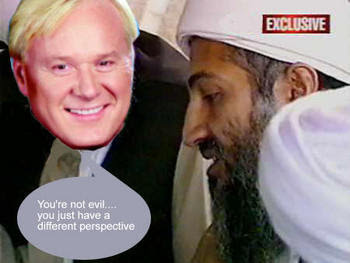In my opinion there is no political figure of the last several generations that has made a greater impact on the state of the world today than British PM Tony Blair. He has inspired me to lead a life of public service and he has set his nation on a course toward a bright future by constructively working with his counterpart across the pond in ways and at levels which his European brothers were never able to duplicate. His arguments in support of the war against terrorists has successfully plugged the intellectual leaks in President Bush's rhetorical style, and has retained much of the multinational forces' otherwise waning legitimacy.
The following is the text of the Prime Minister's annual address before the Lord Mayor's Banquet in London, a speech traditional used by British premiers to outline their foreign policy. The speech was delivered on 13 November 2006.
My Lord Mayor, My Late Lord Mayor, Your Grace, My Lord High Chancellor, Your Excellencies, My Lords, Aldermen, Sheriffs, Chief Commoner, Ladies and Gentlemen.
Remembrance weekend took on a special poignancy this year. No longer do we only look back, nostalgia mixed with emotion and pride, on the supreme sacrifices of two World Wars.
In this century, a new and unconventional enemy has appeared: a global terrorism, based on a thoroughly warped misinterpretation of Islam, which is fanatical and deadly. It was present for years but little noticed by us, before 9/11. Since 9/11, it has cast its shadow over the Western world.
The bomb which killed British forces in Iraq yesterday was a cruel and wicked reminder that this terrorism is dedicated to one end: to stop democracy flourishing in Arab and Muslim countries; to foster sectarian division; to drive out the possibility of reconciliation between people of different faiths.
In defiance of the wishes of the Government of Iraq, now elected, and of the UN which for over three years has supported that democratic process, they urge violence to eliminate hope. In Basra, we are halfway through the army and police operation, which British forces are supporting, to put the proper authorities in charge of the city. It is an operation that is succeeding. The bomb was designed to stop it.
Do not countenance the myth that it is a protest about the so-called occupation of Basra by British forces. On the contrary, the terrorists know the whole purpose of the operation we are conducting with the Iraqi forces is to allow Iraqis to take charge.
Once again we should reflect on the quite humbling courage of the British Armed Forces. They are remarkable people, making an extraordinary sacrifice. They have our admiration. And for the families of those that have fallen, we extend to them our most profound sympathy and condolences.
Both in respect of Iraq and Afghanistan this weekend we remembered those who have died. But it is critical that we understand what links both struggles. Of course, in each case there are very specific national factors at play.
But in the ideology and methods that are fuelling the violence in both countries, there is a common set of characteristics. It is the same ideology, the same methods that have seen thousands die in acts of terrorism across the world.
In Iraq, the pressure from such terrorism has changed the nature of the battle. Its purpose is now plain: to provoke civil war. The violence is not therefore an accident or a result of faulty planning. It is a deliberate strategy. It is the direct result of outside extremists teaming up with internal extremists - al-Qaeda with the Sunni insurgents, Iranian backed Shia militia - to foment hatred and thus throttle at birth the possibility of non-sectarian democracy. These external elements are, of course, the same elements driving extremism the world over.
This is crucial to our understanding of the right strategy to combat it. The majority of Iraqis don't want this extremism - they showed that when they voted for an explicitly non-sectarian Government. But the terrorists are trying to propel them towards it.
Just as the situation is evolving, so our strategy should evolve to meet it.
Inside Iraq we should empower the Iraqi leadership that wants to take responsibility - that knows that they, not us, must lead and win the fight against terrorism. To do this, effectively, they need our support, politically, in their economy and for their armed forces.
- First, we need a strong political compact in Iraq led by the Iraqi Government to bring all parties together, with clear commitments to non-sectarian government and to democracy;
- Second, we need to build Iraqi governing capability, especially in the disbursement of money for reconstruction and rebuilding of the economy;
- Third, we must plug any gaps in training, equipment and command and control in the Iraqi Army and help the new Interior Minister root out sectarianism in the police, which in turn will allow us, within the timeframe set down by General Casey, to transition to Iraqi control.
However, most crucial is this. Just as it is, in significant part, forces outside Iraq that are trying to create mayhem inside Iraq, so we have to have a strategy that pins them back, not only in Iraq but outside it too.
In other words, a major part of the answer to Iraq lies not in Iraq itself but outside it, in the whole of the region where the same forces are at work, where the roots of this global terrorism are to be found, where the extremism flourishes, with a propaganda that may be, indeed is, totally false; but is, nonetheless, attractive to much of the Arab street.
That is what I call a "whole Middle East" strategy.
There is a fundamental misunderstanding that this is about changing policy on Syria and Iran. First, those two countries do not at all share identical interests. But in any event that is not where we start.
On the contrary, we should start with Israel/Palestine. That is the core. We should then make progress on Lebanon. We should unite all moderate Arab and Moslem voices behind a push for peace in those countries but also in Iraq. We should be standing up for, empowering, respecting those with a moderate and modern view of the faith of Islam everywhere.
What is happening in the Middle East today is not complex. It is simple. Iran is being confronted over its nuclear weapons ambitions. Its stock market has lost a third of its value in the last year and foreign credit is increasingly hard to come by. The statements of its President - such as wiping Israel from the face of the earth - are causing alarm, even in Iran.
To be fair, they have a genuine, if entirely misplaced fear, that the US seeks a military solution in Iran. They don't. But we all want Iran to suspend its enrichment process which if allowed to continue, will give them a nuclear weapon. Under the agreement we brokered in June, the US has said they will talk to Iran direct for the first time in 30 years, if they abide by the UN demand to suspend enrichment. But Iran is refusing to do it.
Instead they are using the pressure points in the region to thwart us. So they help the most extreme elements of Hamas in Palestine; Hizbollah in the Lebanon; Shia militia in Iraq. That way, they put obstacles in the path to peace, paint us, as they did over the Israel/Lebanon conflict, as the aggressors, inflame the Arab street and create political turmoil in our democratic politics.
It is a perfectly straightforward and clear strategy. It will only be defeated by an equally clear one: to relieve these pressure points one by one and then, from a position of strength to talk, in a way I described in July in my speech in Los Angeles: offer Iran a clear strategic choice: they help the MEPP [Middle East Peace Process] not hinder it; they stop supporting terrorism in Lebanon or Iraq; and they abide by, not flout, their international obligations. In that case, a new partnership is possible. Or alternatively they face the consequences of not doing so: isolation.
The basic point I come back to, again and again and which I have made many times here - is that whether in Iraq, or Afghanistan or indeed combating terrorism here, these battles are inextricably bound together. It is a global issue. It needs a global response.
Which brings me to the principal consideration of Britain's foreign policy over the past 10 years.
Global challenges can only be met by global alliances. A nation like Britain has no prospect - none - in the world as it is developing today, of pursuing its national interest except in close concert with others. That is why, no matter how tough the test, and these past years since 9/11 have shown how tough it can be - the alliances Britain has with America and within Europe, must remain the cornerstones of our policy.
Do not misunderstand me. I support the US willingly. I believe in the EU for reasons of principle. I supported the conflicts in Afghanistan and Iraq because I believed them right. I have put Britain at the centre of Europe because I am proud that we are part of the largest political union and biggest economic market in the world. For me these alliances have never been a struggle between individual conscience and duty to my country. It is a happy marriage of conviction and realpolitik.
But just for a moment, leave aside the obvious and deep-rooted ties of history with America. Leave aside the fact that only, together, when the US finally entered WWII, were we able to succeed. Leave aside the prospect of Britain facing the Cold War for half a century without the transatlantic alliance, an absurd thought. Leave it all aside and focus on today and the future.
Take any problem Britain wants solving: global terrorism - (assuming you don't believe that but for George Bush it wouldn't exist); climate change; Israel/Palestine; Iran and North Korea's nuclear programme; world trade; Africa in general, right now Sudan in particular; global poverty.
We may agree or disagree with the US position on some or all of these issues. But none of these vital British concerns can be addressed, let alone solved, without America. Without America, Kosovo could not have been attempted. Without Kosovo, Milosevic might still be running Serbia; and the Balkans rather than stabilising with a potential future in Europe, would have remained the destabilising force it was for most of the 20th Century. We need America. That is a fact.
All that, in a sense, is obvious. But - runs the more sophisticated argument -: America we like, this American President we don't. This is a comforting argument. It separates anti-America from anti-Bush. However it is also a cop-out.
Let us not kid ourselves. 9/11 would have changed any American President's foreign policy. 3000 innocent people dead in the streets of New York; the al-Qaeda operatives who did it, trained out of Afghanistan. Following 9/11, American policy was going to shift. It was going to get out after the terrorists with all America's might and any President who didn't do it, wasn't going to be President for long.
When I said, after 9/11 that we should stand shoulder to shoulder with America, I said it because I believed it. But I also thought it was profoundly in Britain's interests. I knew this attack wasn't aimed at America per se; but at America as the leading representative of our values.
Look round the world today; look even just within Europe. Britain is not the only country that faces a terrorist threat. We all do, allies and non-allies, anyone in fact that isn't "them". I thought then and I think now that defeating this threat - whose roots are deep and have been a long time growing - was going to take a generation; and I knew then and know now that defeating it, was never going to be done without an America prepared to lead as America, to its credit, has.
And the truth is, for Britain, it is always right for us to keep our partnership with America strong.
Post 9/11, there were no half-hearted allies of America. There were allies and others. We were allies then and that's how we should stay; and the test of any alliance, I'm afraid, is not when it's easy but when it's tough.
Most bizarrely, there is a significant section of British opinion today that wants us both distant from America and from the EU. Some Prime Ministers, when they actually have to deal with what can be a maddening process in Europe, become disillusioned with the whole thing. Not me.
I can't see a single good reason for Britain not being at the centre of Europe and every good reason why it should be. Europe gives us weight and strength. In fact, in my view, Europe should be far more confident about its potential. Provided it eschews grand institutional visions and concentrates on grand practical visions - for prosperity, in energy, fighting crime, in developing defence capability - it has a huge, even exciting future. Enlargement has been remarkable. And on all these issues Britain has been in a clear leadership position. We should rejoice in it.
These alliances will become more not less crucial.
We all welcome the benign economic and political development of China. But its force is one to be reckoned with. All of us too can see how Russia has emerged under President Putin as a stronger, more confident nation. But it also knows it is a major power and we rely on its energy resources. India is making extraordinary strides in every way. But it, like China, will be a nation more than twice the size, in population, of the whole of Europe.
Let me put this delicately but firmly. The world is changing. New powers are emerging. In the decades to come there will be many international negotiations, debates, occasionally, if only in a diplomatic sense, confrontations.
Britain in this early 21st Century world is a country with extraordinary strengths. It is well and justifiably respected. But it is also a country of 60 million people whose geography could fit neatly into a corner of Alaska. We will need collective strength in the years ahead. That strength is infinitely easier to generate, and more to our liking, if based on alliances with nations that share our values.
For that reason, our partnership with America and our membership of the EU are precisely suited to Britain. For that reason, it would be insane, - yes I would put it as strongly as that - for us to give up either relationship. For that reason anti-Americanism or Euroscepticism are not merely foolish they are the surest route to the destruction of our true national interest.
Both alliances are founded in history. Both are, however, now, at this point, utterly validated by the future. These are no misty-eyed products of sentiment, relics of a bygone age to be taken out and cradled fondly. They are the vital life source of British power, influence and weight in the new global community taking shape around us. To nurture and enhance them is not vain glory. It is the most hard-headed realism. Lose them - and alliances are like all living things, neglect them and they die - and we will spend a long time struggling to revive what's gone.
When people say: yes, but we want a "British" foreign policy, I say: of course we do, but in today's world a foreign policy based on strong alliances, is the only "British" policy which works.





















